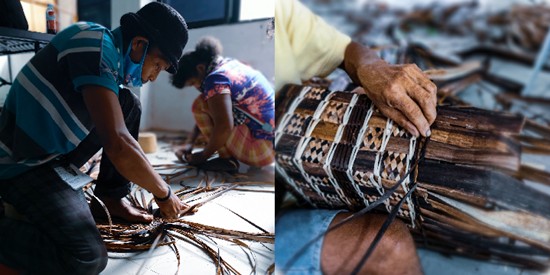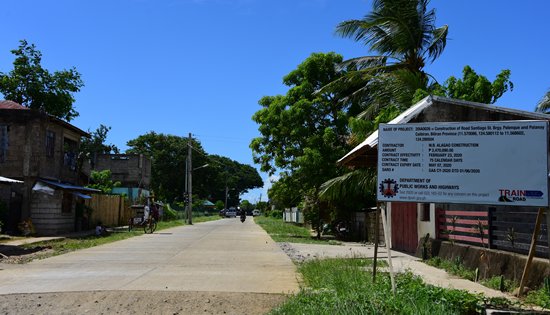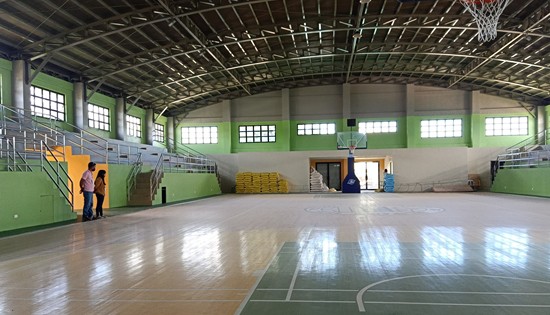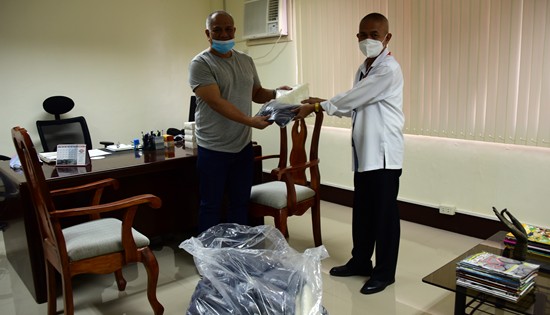DTI trains
Surigao Norte IPs in handicraft making

By
DTI-Regional Operations
Group
June 24, 2020
MAKATI CITY –
Twenty members of the Mamanwa tribe in Brgy. Camp Edward, Alegria,
Surigao del Norte were trained in handicraft making through the
partnership of the Department of Trade and Industry (DTI) and the
National Commission for Indigenous Peoples (NCIP).
The indigenous people (IP)
were trained to produce mats, bags, baskets and other handcrafted
products using indigenous materials growing prominently in the area
such as abaca, rattan strips (lagus), and golden sika (sayabay).
The training aimed to
equip selected participants with necessary skills as preparation to
potential bulk orders since only few from the community has enough
knowledge on handicrafts products as seen through the validation
conducted by DTI-Surigao del Norte.
Manny Venus and Felix
Abatayo, skilled weavers in Brgy. Camp Edward, served as the
trainers who supervised the three-day activity.
To help the Mamanwas meet
their assigned tasks during the workshops, starter kits and tools
were given for their processing activities.
Participants were expected
to execute and produce at least five designs for product enhancement
and mass production.
The outputs of this
activity will be market matched in the local and regional market and
will also be showcased in trade fairs.
“Gusto namo nga pag
mahisgotan ang Mamanwa sa Alegria, ang produkto ang malambigit sa
amo, dili lang ang among royalty (We want that the Mamanwa in
Alegria will also be known because of our products, not just because
of our royalty,” one of the participants said.

Completed
P2.5M construction of road situated in Santiago St, Brgy.
Palenque in Caibiran town. |
2 access road
projects in Brgy. Palenque, Caibiran, Biliran completed
By
DPWH-Biliran
June 22, 2020
NAVAL, Biliran –
Two road concreting projects leading to essential establishments in
Caibiran town have been completed by the Department of Public Works
and Highways (DPWH) Biliran District Engineering Office (DEO).
The said projects are
located at Santiago Street and Mocorro St., both in Brgy. Palenque
with a total length of 0.284-kilometer two lane road.
David Adongay Jr.,
District Engineer said that these roads were prioritized because the
existing concrete road already shows deterioration and may cause
accidents to motorists.
“The newly completed
projects are deemed important as these roads both lead to essential
establishments of the town,” said Adongay.
Situated along this road
projects are Caibiran Elementary School and Palenque Rural Health
Unit (RHU). These roads also lead to the Municipal Hall Building and
Gymnasium of the town.
According to Adongay,
residents, students, health workers, patients and motorists
traveling along these roads are the beneficiaries of these projects.
They can now enjoy a convenient travel and a safer transport of
goods and other services.
Both projects have a total
amount of P3.7M under contract with W.B. Alagao Construction. The
projects were both implemented under 2020 Local Infrastructure
Program (LIP).
Moreover, Biliran DEO has
also completed the P1.1M road construction at Rizal St. in Brgy.
Palanay and the P2M road construction at Brgy. Victory both in
Caibiran town.
Notorious
communist NPA extortionist neutralized in Northern Samar

By
DPAO, 8ID PA
June 21, 2020
CAMP LUKBAN, Catbalogan
City – A notorious Communist NPA Terrorist (CNT) who is
responsible in various extortion activities targeting the government
infrastructure projects and business establishments in the pacific
towns of Northern Samar and his aide were neutralized by the
combined elements of 803rd Infantry Brigade's Team Peacemaker and
Northern Samar Police Mobile Force Company while conducting an
interagency law enforcement operation on June 20, 2020 at the
vicinity of Brgy. Bagacay, Palapag, Northern Samar.
The fatalities were
identified as Zaldy Meraya alias Podyot/Bato, Finance Officer of
Squad 1, Front Committee (FC) 15, Sub-Regional Committee (SRC)
Arctic and his aide Bebe Tobino alias Kidlat/Lawin, member of Squad
1, Sandatahang Unit Pampropaganda (SYP) Platoon, FC15, SRC Arctic.
A brief arm engagement
ensued when the CNTs fired upon the government troops who were about
to serve a warrant of arrest issued by Judge Decoroso M Turla dated
May 11, 2020 with Criminal Case Number 5712 for multiple attempted
murder.
The said law enforcement
operation was launched as an offshoot to the encounter between 20IB
and NPA at the vicinity of Sitio Cag-anibong of same barangay on
June 14, 2020 where a combat tracking conducted by the pursuing
troops led them towards the safe house of alias Podyot.
Seized from the encounter
site were two (2) Cal.45 pistols, one (1) Acer laptop, twelve (12)
assorted cellular phones, three (3) flashdrives (USB) and subversive
documents.
Colonel Lowell Tan,
Commander of the Army’s 803rd Infantry (PEACEMAKER) Brigade, said
that the neutralization of alias Podyot will lessen if not totally
stop the extortion activities and resource generation of CNTs in the
pacific towns.
Labor group
affirms Philippines among top 10 dangerous place for workers
By
ALU-TUCP
June 20, 2020
QUEZON CITY – The
Philippines is among the top ten worst countries for workers in 2020
based on the 2020 Global Rights Index issued by the International
Trade Union Confederation (ITUC). The other countries include
Bangladesh, Brazil, Colombia, Egypt, Honduras, India, Kazakhstan,
Turkey and Zimbabwe.
With this, the Associated
Labor Unions-Trade Union Congress of the Philippines (ALU-TUCP) are
fully in accord with the findings of the International Trade Union
Confederation (ITUC) and stand by their listing of the Philippines
as one of the top 10 most dangerous countries in the world for
workers.
"When we consider the
actual circumstances on the ground, the current state of labor
relations policy during the quarantine allowing wage reductions and
suspending labor rights inspections, the anti-labor and the
anti-consumer program of our economic managers to raise anew excise
taxes and opposing security of tenure, as well as the dangerous
political slide towards authoritarianism evidenced by passage of the
Anti-Terror Bill, we see the handwriting clearly on the wall:
workers rights and workers are and will be victims in the current
political environment, the labor federation in a statement said.
"There remains unresolved
assassinations, allegedly labor-related disappearances, various
repressions, red-tagging and wanton attacks on workers and workers'
fundamental rights that makes the current environment dangerous and
difficult for workers.
We foresee the conditions
to get even worse in the days ahead. With the current full
operationalization of police and military offices in ecozones to
combat what they describe as "radical trade unions", the inevitable
enactment and enforcement of anti-terror bill and the current
aggressive push by business owners in cahoots with the economic
managers for increased labor flexibilization, wage reduction and the
lowering of labor standards – using the COVID19 and the growing
great global depression as the justification to justify and peddle
their wrong-headed prescriptions to keep private profits high and
social spending low, is now making the country more dangerous and
more difficult place for workers to live and to work and are
promoting unproductive and very dangerous class warfare.
We urge our national
government to listen to us and to remember the lessons to history.
In the midst of the last great depression in the 1930's, there were
two paths taken by different models of government, those who
followed the totalitarian temptation and those who followed the path
of worker protection and social protection. The former's repression
collapsed their countries and governments around them in bitterness,
sorrow and World War defeat. The latter model led to collective
prosperity and increased grassroots democracy.
We plead to our national
leadership to step back from the brink of this totalitarian
temptation and accept the path of building back better by upholding
our individual civil and political liberties, respecting our
collective economic rights, and by putting our workers interests
first. This is the path to saving jobs and saving lives." they said.
The ITUC Global Rights
Index depicts the world's worst countries for workers based on the
degree of respect for workers' rights by rating 139 countries on a
scale from 1 to 5. Workers' rights are absent in countries with the
rating 5 and violations occur on an irregular basis in countries
with the rating 1.
The index was developed to
increase the visibility and transparency of each country's record on
workers' rights. The ITUC affiliates in the Philippines are the
Trade Union Congress of the Philippines (TUCP), Federation of Free
Workers (FFW), Sentro, and Kilusang Mayo Uno (KMU).
The ITUC is the world's
largest trade union federation with 200 million workers in 163
countries through the 332-member national labor federations around
the world. It is the global voice of the world's working people.
It's mission is to promote and defend workers' rights and interests
through international cooperation between trade unions, global
campaigning and advocacy within the major global institutions.
|

The
completed construction (improvement) of Multi-Purpose
Building, Barangay San Isidro, Biliran, Biliran. The project
is under contract with Titanya Construction & Development
Corp. with an allocation amount of P10M. The completed
project will provide the community a space to hold variety
of activities and services. |
P10M improvement
of multipurpose building (gymnasium) in Biliran town completed
By
DPWH-Biliran
June 18, 2020
NAVAL, Biliran –
The Department of Public Works and Highways (DPWH) Biliran District
Engineering Office (BDEO) has completed the P10M improvement of
multipurpose building (gymnasium) in Biliran town situated in Brgy.
San Isidro.
David Adogay Jr., District
Engineer said that completed facility is now ready to cater
different sports activities and other services needs of the
community.
“The improved gymnasium
features basketball court flooring, digital scoreboards and court
bleachers and is also equipped with parking spaces,” Adongay
revealed.
Adongay said that the new
gymnasium is designed to provide comfort during sports events and
other activities that cannot be done outdoors or on the field.
Aside from sports
activities, he also added that the facility can also be used as a
venue for seminars, meetings, medical missions, rallies and event
competitions. This can also be used as an evacuation center to
residents in times of calamities.
According to Adongay, all
residents in Biliran town can benefit this new facility. The said
town has a total inhabitants of 16,882 based on the 2015 census of
population.
The completed project
which started construction in August 2019 was implemented under 2019
Local Infrastructure Program (LIP) under contract with Titanya
Construction & Development Corp. This project was completed on
February 28, 2020.
PH game
developers explore opportunities with Malaysia
By
DTI-TPG-Export
Marketing Bureau
June 11, 2020
MAKATI CITY – The
global gaming industry was estimated to be valued at US$152.1
billion in 2019 which shows that there’s a huge chunk of the market
that is open to be served and explored by the Philippines given the
current share and capability of the game development industry.
To boost the local game
development industry, the DTI-Export Marketing Bureau (EMB) hosted a
webinar on 8 June 2020 with the Malaysia Digital Economy Corporation
Sdn Bhd (MDEC), Philippine Trade and Investment Center-Kuala Lumpur
and the Game Developers Association of the Philippines (GDAP) for
Philippine game developers to explore opportunities and widen
network with Malaysia.
“The young generation of
today in the Philippines and Malaysia have been exposed heavily to
digital media entertainment. The digital industry is said to be one
of the major propellers driving the ASEAN economy along with the
richest countries in the world, whereby online gaming has come to
greater heights as compared from the last decade,” said DTI
Undersecretary for Trade Promotions Group (TPG) and Special Concerns
Abdulgani M. Macatoman.
MDEC Vice President Hasnul
Hadi Samsudin said that Malaysia’s gaming industry is one of the
fastest growing exports, with 57 companies in the country. He also
said that Malaysia is the regional gaming hub because of highly
skilled talent, strategic location, high market growth, a vibrant
game ecosystem, good internet infrastructure, and strong government
support.
Meanwhile, GDAP President
Alvin Juban shared the Philippine roadmap and the challenges faced
by Filipino game developers. The roadmap was created in 2014 and
involved three steps: gain a new flagship client, gain a flagship
studio, and create a Triple-A game – a game with big production and
marketing budgets. The industry already achieved the first two
milestones with Gears of War 4 signing with Synergy88 in 2015 and
Ubisoft locating in Laguna in 2016.
In terms of nurturing
talent, the number of higher education institutions offering game
development increased from 2 in 2014 to 8 at present. The number of
graduates more than doubled from 300 in 2014 to an expected 1,000
this year.
Juban cited the need for
more original content, attractive incentives, and Manila-centric
development to address the weaknesses hampering the local growth.
Meanwhile, DTI
Undersecretary for Competitiveness and Innovation Group (CIG)
Rafaelita M. Aldaba welcomed closer collaboration with the gaming
industry, saying that the DTI’s main strategy is to move more
industries outside of NCR.
“I also believe that the
opportunities are tremendous, given the talent. With the proper
support, the proper business, the proper operating environment, I
think we could really grow the sector here in the country. One that
could provide high-paying jobs. A sector that could provide export
earnings. At the same time, a sector that could provide services to
the domestic market. There's so much that we can do together,” she
said.
DepEd has funds
for teachers’ monthly internet allowance, ACT bares
ACT Press Release
June 11, 2020
QUEZON CITY – The
Alliance of Concerned Teachers (ACT) revealed that the Department of
Education (DepEd) has ‘more than enough’ budget to provide for the
group’s demand to provide the almost one million public school
teachers with P1,500 per month internet allowance. The group
estimates that the said stipend will only amount to P1.5 billion a
month and a total of P16.5 billion for the months of June 2020 to
April 2021.
 “Internet connection is
basic and vital for DepEd’s work-from-home arrangements and distance
learning. Without it, teachers won’t be able to conduct meetings,
enroll learners, submit forms and reports, hold classes, and monitor
and assess students. Hence, DepEd must fund this necessity that now
plays key to its mandate to deliver education,” pressed ACT
Secretary General Raymond Basilio.
“Internet connection is
basic and vital for DepEd’s work-from-home arrangements and distance
learning. Without it, teachers won’t be able to conduct meetings,
enroll learners, submit forms and reports, hold classes, and monitor
and assess students. Hence, DepEd must fund this necessity that now
plays key to its mandate to deliver education,” pressed ACT
Secretary General Raymond Basilio.
Basilio stressed that the
provision of sufficient technological and logistical support will be
decisive in enabling DepEd’s Basic Education-Learning Continuity
Plan (BE-LCP) and Oplan Balik Eskwela (OBE). ACT said that the
agency’s 2020 allocation for maintenance and other operating
expenses (MOOE) is P95 billion, with P30.6 billion going to school
operations. This means that the funding requirement for vital
internet allowance will only be 17.4% of DepEd’s total MOOE and 54%
of school operations budget.
“These figures prove that
the granting of an internet allowance is completely doable as DepEd
is sure to gain much from the savings in the utilities and supplies
expenditures of schools and offices since the lockdown and the whole
period when face-to-face reporting and classes will remain
prohibited,” argued Basilio.
Basilio hit DepEd for
‘magnifying the meager P3,500 per year teaching supplies allowance
to cover up its failure to provide for the necessities of distance
learning.’ He said that the amount could only cover up to two months
of internet expenses, while teachers are still beset with concerns
of laptops that need repair and upgrading, cellphone load to contact
students and other expenses for the development of their teaching
materials.
“DepEd is making it appear
like teachers are getting a new allowance when in fact it is an old
benefit that teachers gained through years of struggle and is now
sorely insufficient given the great financial demands of distance
learning on teachers,” explained Basilio.
Basilio further pointed to
other DepEd funds from where the internet allowance may be sourced.
“It will further save on
hefty training funds as only a P200–P300 cellphone load credits is
allowed for disbursement to teacher-participants in webinars while
the pre-pandemic allotment amounts to P1,500 per participant for
venue and food. Budget for officials’ travels abroad should also be
tapped as travel restrictions remain in place due to the pandemic.
DepEd may also use its generated income from revolving funds like
the service charges from private lending institutions that make use
of the agency’s APDS (Automatic Payroll Deduction System),” cited
Basilio.
ACT added revenue sources
at the school level such as penalties for lost DepEd-issued
materials, fees for venue rentals, income generating projects, and
donations from private stakeholders.
The teachers’ group echoed
to the agency the consistent call of DepEd officials to teachers:
‘find ways and means, be creative and resourceful.’ Educators and
learners deserve nothing less from the government, ACT concluded.
DTI-Export
Marketing Bureau hails exporter-turned-PPE maker

By
DTI-TPG
June 9, 2020
MAKATI CITY – The
Department of Trade and Industry-Export Marketing Bureau (DTI-EMB)
hailed local Personal Protective Equipment (PPE) maker for
spearheading the PPE Bayanihan Project for healthcare frontliners.
Since the country has been
under quarantine, all but essential businesses are closed, including
Leather goods manufacturer The Leather Collection (TLC).
The company, availing
business matching services from the DTI-Export Marketing Bureau, was
already exporting their products. But they had to shut down
operations due to the covid-19 pandemic. Instead of being
discouraged, TLC Chairman Federico Sevilla, Jr., and CEO Yolanda
Sevilla used the time to spearhead the PPE Bayanihan Project for
healthcare frontliners.
To date, they have donated
over 15,000 PPE (face shields, isolation gowns, and jumpsuits) to 82
hospitals, rural health units, and health centers in Metro Manila,
Laguna, Batangas, Bulacan, Nueva Ecija, Antique, Quezon, Leyte,
Bataan.
The PPE Bayanihan Project
began when the Fashion Design and Merchandising School of the
College of St. Benilde (St. Benilde FDM) asked for materials to make
Personal Protective Equipment (PPE). TLC gave water-resistant lining
material and Benilde FDM acknowledged their donations in a Facebook
post.
A friend of the Sevillas
heard of their donation and donated P100,000 seed money to fund the
project. Another donated rolls of water-resistant material. A third
called to say he had a network of home-based sewers in Bulacan who
could make the PPEs.
With all these elements in
place, the PPE Bayanihan Project was launched. Its objective was and
still is to provide our health care workers with PPEs since the
demand for these was high and the supply scarce and were very
important for protecting the health of the medical workers as well
as prevent the transmission of COVID-19.
More friends and friends
of friends got into the bandwagon – donating and soliciting
donations, vetting requests for donations from hospitals, rural
health units, health centers, and health care workers.
TLC functioned as the
operations center: receiving and accounting for donations of money
and materials; sourcing, qualifying and repurposing materials;
product research and design; prototyping and approval of prototypes
by anesthesiologists; coordinating production; receiving and
dispatching finished goods which included face shields, isolation
gowns, and coveralls or jumpsuits.
The PPE Bayanihan Project
not only helped protect the front-liners but also allowed the
Sevillas to leverage their experience in manufacturing; allowed
volunteers to help stem the tide of contagion; and provided
livelihood to home-based sewers in Guiguinto and Baliuag, Bulacan.
|

Assistant
District Engineer Alfredo L. Bollido (right) handed a total
of 60 pcs. washable Personal Protective Equipment (PPE) to
the Biliran Provincial Hospital (BPH) in Naval Biliran
through Dr. Edgar Veloso (left) , Biliran Provincial Health
Officer on June 02, 2020. |
DPWH-Biliran DEO
donates protective equipment to frontliners
By
DPWH-Biliran
June 8, 2020
NAVAL, Biliran – In
an effort to mitigate the spread of Coronavirus Disease 2019
(COVID-19), the Department of Public Works and Highways (DPWH)
Biliran District Engineering Office (DEO) donates Personal
Protective Equipment (PPE) to front liners in this province.
David P. Adongay Jr.,
District Engineer said that a total of 120 pcs. washable PPE has
been donated to selected health facilities and response units as a
simple way of showing support to the front liners in the battle
against COVID-19 pandemic.
“Our front liners are
considered new heroes today, protecting us from the unseen enemies,
so it is just right that we armed them with the equipment during
this war against COVID-19 pandemic,” said Adongay.
Meanwhile, Alfredo L.
Bollido, Assistant District Engineer who spearheaded the
distribution of PPE to front liners expressed his strong support and
respect to all workers in the frontline.
“This is just a simple way
to thank our front liner workers in their heroic acts. In this time
of crisis, I wish them to stay healthy and safe to continue serving
and helping our people in need.,” Bollido said.
On June 02, 2020, a total
of 60 pcs. PPE was delivered to Biliran Provincial Hospital, 10 pcs.
to Bureau of Fire Protection (BFP)-Naval, and 20 pcs. PPE to Rural
Health Unit (RHU) -Naval.
On June 04, 2020,
RHU-Almeria also received a total of 10 pcs. PPE and BFP Provincial
Office got 20 pcs.
Biliran Province recorded
its 1st confirmed case of COVID-19 on Wednesday, June 03, 2020 as
announced by Naval Town Mayor Gerard Espina.
Meanwhile, DPWH-Biliran
DEO continues to observe strict safety precautionary measures to
protect employees and prevent the transmission of COVID-19 in the
workplace following DPWH guidelines on basic personal hygiene,
workplace sanitation and social distancing measures under Department
Order (D.O.) No. 34 series of 2020.
Policy on rent
has not changed, MSMEs still covered under ECQ, MECQ, GCQ – DTI
Chief
By
DTI-OSEC-PRU
June 7, 2020
MAKATI CITY –
Department of Trade and Industry (DTI) Secretary Ramon Lopez
corrected an article that came out in one newspaper and reiterated
that the 30-day grace period in the payments for residential and
commercial rents still has not changed, and still applies to micro,
small, and medium enterprises (MSMEs) not permitted to operate
during the Enhanced Community Quarantine (ECQ).
This was followed by the
issuance of DTI Memorandum Circular (MC) No. 20-31, s. 2020 on 4
June 2020, which clarified certain provisions in the earlier
released supplemental guidelines of MC 20-12, particularly that the
grace period on rents are covered under the ECQ, the Modified ECQ (MECQ),
and the General Community Quarantine (GCQ).
“As we slowly transition
to the new normal, we need to ensure the survival of businesses
during these difficult times and in the months beyond the lifting of
the quarantine,” Sec. Lopez said.
In the spirit of goodwill,
generosity, and fair play, lessors of commercial spaces are also
enjoined in the new MC to adopt any of the following: totally or
partially waive the commercial rents that are falling due during the
ECQ, MECQ, and GCQ; grant reprieve or a reduction in the amount of
rent due in the months following the ECQ, MECQ, and GCQ; open for
renegotiation the Lease Term Agreements with the lessees; and use
other recourse to mitigate the impact of the ECQ, MECQ, and GCQ to
the MSMEs.
The trade chief reiterated
his call to all lessors to continue to support and provide relief to
MSMEs in anticipation of the slow restarting of the economy. He
added that MSMEs currently employ 70% of the workforce and
emphasized the need to ensure the survival of these businesses
during the crisis, as well as protect the jobs it has created for
millions of Filipinos.
“These guidelines will
help our countrymen in the wake of the restrictions imposed during
the Community Quarantines (CQ) that have severely affected
businesses, especially MSMEs," Sec. Lopez said.
According to the
guidelines, the grant by the lessor of a minimum 30-day grace period
for residential rent shall commence from the last due date or from
the lifting of the ECQ, MECQ, and GCQ, whichever is longer.
For commercial rents
falling due upon MSMEs and sectors not permitted to operate during
the ECQ, MECQ, and GCQ, the minimum 30-day grace period shall
likewise be from the last due date or from the lifting of the ECQ,
MECQ, and GCQ, whichever is longer.
Tenants also have the
option to pay the cumulative amount of residential and commercial
rents stated above – that fall due within ECQ, MECQ, and GCQ – in
installments equally amortized in six (6) months following the end
of the 30-day minimum grace period.
All unpaid rents during
the CQs shall not incur interests, penalties, fees, and other
charges.
No eviction for failure to
pay the residential or commercial rent may be enforced during the
quarantine period. However, lessors are not obliged to refund
residential and commercial rents paid by the lessees before or
during the period of the community quarantine.
The complete amended
supplemental guidelines on the concession of residential and
commercial rents can be accessed thru:
https://bit.ly/DTI_MC2031